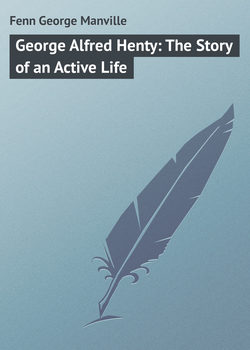George Alfred Henty: The Story of an Active Life

Реклама. ООО «ЛитРес», ИНН: 7719571260.
Оглавление
Fenn George Manville. George Alfred Henty: The Story of an Active Life
Preface
Chapter One. Early Days
Chapter Two. From Cambridge to the Crimea
Chapter Three. Invalided Home
Chapter Four. The First Glimpse of Italy
Chapter Five. The Italian War
Chapter Six. The Search for an Army and a Meal
Chapter Seven. The Battle of Lissa
Chapter Eight. The End of the War
Chapter Nine. Impressions of Italy
Chapter Ten. The Visit to San Marino
Chapter Eleven. A Land of Mystery
Chapter Twelve. A Subterranean Excursion
Chapter Thirteen. Mining for Mercury
Chapter Fourteen. The Abyssinian Campaign
Chapter Fifteen. Incidents of Transport
Chapter Sixteen. En Route for Magdala
Chapter Seventeen. Jottings by the Way
Chapter Eighteen. King Theodore at Bay
Chapter Nineteen. The Fall of the Curtain
Chapter Twenty. The Suez Canal
Chapter Twenty One. The Franco-German War
Chapter Twenty Two. The Commune
Chapter Twenty Three. The Vendôme Column
Chapter Twenty Four. The Days of Reprisal
Chapter Twenty Five. A Word about Politics
Chapter Twenty Six. On the Life of a War Correspondent
Chapter Twenty Seven. A Risky Cruise with H.M. Stanley
Chapter Twenty Eight. The “Weaker Sex” in Ashanti
Chapter Twenty Nine. Warfare in the Bush
Chapter Thirty. The March up Country
Chapter Thirty One. The Battle of Amoaful
Chapter Thirty Two. A Carlist War
Chapter Thirty Three. The Royal Tour in India
Chapter Thirty Four. Among the Turks
Chapter Thirty Five. Philosophy in Camp
Chapter Thirty Six. The Turkish Army
Chapter Thirty Seven. A Busy Convalescence
Chapter Thirty Eight. Concerning War Correspondents
Chapter Thirty Nine. Henty and his Books
Chapter Forty. An Appreciation
Chapter Forty One. Personal Notes
Chapter Forty Two. Club Life
Chapter Forty Three. His Great Hobby
Chapter Forty Four. A Final Word
Отрывок из книги
We might know very little of the life of the late George Alfred Henty – writer for and teacher of boys, novelist, and one of the most virile of our war correspondents – but for one fortunate fact. His busy pen soon made him popular, and in course of time this popularity was sufficient to make editors of journals for the young realise that their readers would gladly learn something of the early life of the man whose vivid tales of adventure were being read with avidity wherever the English language had spread. In these days few are content to know a man only by his work, and even boys like to know something about the personality and experiences of the writers who have given them keen pleasure. As a result the inevitable came to pass, and the modern chronicler of personal details sought out the author. To his interviewers Henty told fragments of his past life, and these reminiscences were taken down in short or long hand, and built up into articles, and have remained, to bring before us vividly what would otherwise never have been known save perhaps by tradition.
It is strange now to reflect that the big, robust, heavy, manly-looking Englishman of whom these lines are written, was once a puny, sickly boy who was looked upon by his relatives as one who could never by any possibility attain to man’s estate; but so it was. Here are his own words: “I spent my boyhood, to the best of my recollection, in bed.”
.....
He does not forget to credit his school with the education his Alma Mater afforded him. He says: “She did give me a good drilling in Latin. Perhaps not elegant classical Latin, but good, everyday, useful, colloquial stuff.” In his time the masters were great upon the old dramatic author whom so many of our modern dramatists have tapped right through Elizabethan, Restoration, and more modern times, down to the present. In Henty’s early days, just as is annually the custom now, one or other of Terence’s comedies was chosen for a performance by the Queen’s Scholars, while every other boy as a matter of course had to get up one play as the lesson of the year as well, and doubtless, as has been the case with many a schoolboy in turn, would fall a-wondering how it was that the great Latin poet possessed an Irish name.
Latin verses and Latin colloquial phrases were hard enough to pile up, while parents and guardians, ready enough to complain, found fault at so much time being devoted to the dead languages to the exclusion of those which are spoken now. Hear, ye grumblers, what George Henty says thereon to an interviewer: —
.....